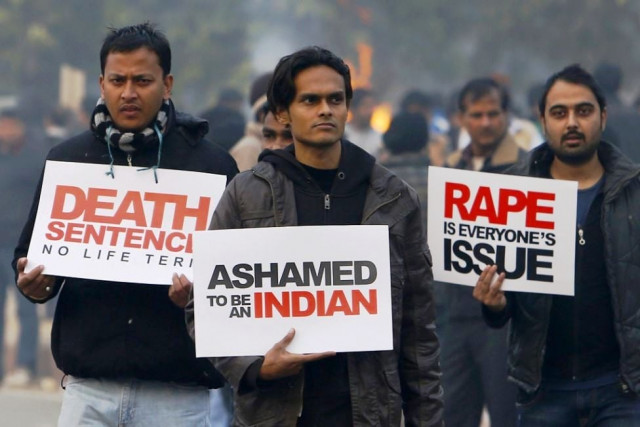By now most of you know that the victim of the New Delhi bus gang rape in India has died. Along with the Indians, a lot of people across the world are still reeling from the shock of the cruelty and utter barbarianism that was meted out to her.
A lot of people are still wondering why...
Let's just remind ourselves what happened to her exactly. On December 16, she, along with her fiancé, was coming back after watching a movie. The couple wanted to go to Dwarka, a place in southwest Delhi when they were tricked into boarding a bus by some men.
What happened then is a tale of truly horrendous proportions.
Six men raped the girl for almost an hour. As if that wasn't enough, they then assaulted her with an iron rod tearing out her intestines. They then threw the girl and her fiancé from the moving bus out onto the road. She was then flown to Singapore where she faced multiple organ failure resulting in her death. A 23-year-old life, snuffed.
Terrible as it is, the pertinent question here is indeed, why?
Sexual violence against women has long been a characteristic of the subcontinent (both India and Pakistan). Men have traditionally held a dominant position in society. When and where their dominance has been challenged or threatened, they have turned to harming innocent women.
At the same time, the people who are supposed to prevent such incidents from taking place (the police and state agencies) are usually controlled and run by men, creating a closed loop of dominance, violence and subjugation.
Because the society as a whole has failed to educate and evolve, the male mindset in India and Pakistan is hard coded into laying the blame squarely on the victim.
In this case, however, the backlash has been strong and unusually robust. The degree of cruelty exhibited has resulted in protests that the government of India has failed to stave off. Any remedial measures will only serve as a band aid - a temporary fix. Even if the six accused are found guilty and hanged, the failed policies and mindset that resulted in this nightmare will continue to chew away at the fabric of society.
So how can change be introduced?
Chemically castrating sex offenders for example, is not going to stop the rape of women.
Hanging culprits might silence the large number of protestors, but it will not end the stressful lives women have to endure in our part of the world.
The dead honest answer is, change will come through education.
We see these heinous crimes take place because as children, these men were never taught to respect women, or told that by defiling women's bodies they do not somehow establish their superiority. If the concepts of right and wrong, of equality of the sexes, of respect, kindness and forgiveness are instilled in children from the get go, then society will gradually begin to change.
Of course, there is the fact that while there is talk of some change taking place in India in response to this abhorrent incident, the same cannot be said for Pakistan where women are buried alive and senators stand in the galleys of the parliament and say that it is our custom and no one has the right to dispute it.
It saddens me immensely that people only raise their voices in the subcontinent after innocent lives have been taken.
In India, it had to be that nameless 23-year-old medical student who was going back home after watching a movie.
In Pakistan currently, it is the 20-year-old Shahzeb Khan who was going to visit his friend.
In both cases, the voices for change came too late, and the mindset that needs to be changed has not been addressed.
How long before the voices die out and we're back to square one?
New Delhi gang rape: Who can change the attitude of such men?
Sexual violence against women has long been a characteristic of both Pakistan and India. Our culture is flawed.



COMMENTS
Comments are moderated and generally will be posted if they are on-topic and not abusive.
For more information, please see our Comments FAQ